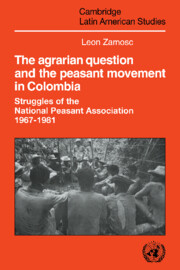 The Agrarian Question and the Peasant Movement in Colombia
The Agrarian Question and the Peasant Movement in Colombia Book contents
- Frontmatter
- Contents
- List of tables, figures, and maps
- Foreword by Tedor Shanin
- Foreword by UNRISD
- Acknowledgments
- List of abbreviations
- Map 1 Republic of Colombia
- Introduction
- 1 The agrarian question in Colombia
- 2 Reformism and the beginnings of the peasant movement
- 3 The radicalization of ANUC and the great waves of land invasions
- 4 Counterreform
- 5 The contradictory influences of peasant politicization
- 6 Concessions and repressive escalation
- 7 The new occupational alternatives and the issue of the rural proletariat
- 8 Partial repeasantization and the question of the new peasant settlements
- 9 Final crisis and clientelist regression of ANUC
- 10 Overview and final remarks
- Notes
- Bibliography
- Index
- Cambridge Latin American Studies
1 - The agrarian question in Colombia
Published online by Cambridge University Press: 10 October 2009
- Frontmatter
- Contents
- List of tables, figures, and maps
- Foreword by Tedor Shanin
- Foreword by UNRISD
- Acknowledgments
- List of abbreviations
- Map 1 Republic of Colombia
- Introduction
- 1 The agrarian question in Colombia
- 2 Reformism and the beginnings of the peasant movement
- 3 The radicalization of ANUC and the great waves of land invasions
- 4 Counterreform
- 5 The contradictory influences of peasant politicization
- 6 Concessions and repressive escalation
- 7 The new occupational alternatives and the issue of the rural proletariat
- 8 Partial repeasantization and the question of the new peasant settlements
- 9 Final crisis and clientelist regression of ANUC
- 10 Overview and final remarks
- Notes
- Bibliography
- Index
- Cambridge Latin American Studies
Summary
The agrarian question can be posed as follows: what is the pattern of agrarian evolution that prevails in capitalist society? The development of capitalism in different countries has shown that there are two basic alternatives. One of them, the “landlord path” of evolution, features the concentration of land ownership, which creates favorable conditions for a capitalist agriculture based upon wage labor and large-scale production. The second alternative, the “peasant path,” is characterized by the distribution of land among large numbers of smallholders, which leads to peasant farming based upon family labor. These alternatives are opposite poles that define a whole range of possible mixed outcomes in which both patterns of production appear side by side. The importance of the agrarian question can be measured by the consequences of its resolution: The socioeconomic structure of the countryside shapes the conditions for economic performance, defines the relative strength of the rural social classes, and sets the stage for their participation in the political processes linked to the development of capitalism. The way in which the agrarian question is resolved depends, in turn, upon a complex mix of historical, socioeconomic, and political factors unique to each country. As a first step in the study of these unique dimensions in Colombia, the first section of this chapter will briefly trace the history of the agrarian question in light of the changes that marked the emergence and development of capitalism.
- Type
- Chapter
- Information
- The Agrarian Question and the Peasant Movement in ColombiaStruggles of the National Peasant Association, 1967–1981, pp. 7 - 33Publisher: Cambridge University PressPrint publication year: 1986
- 1
- Cited by
